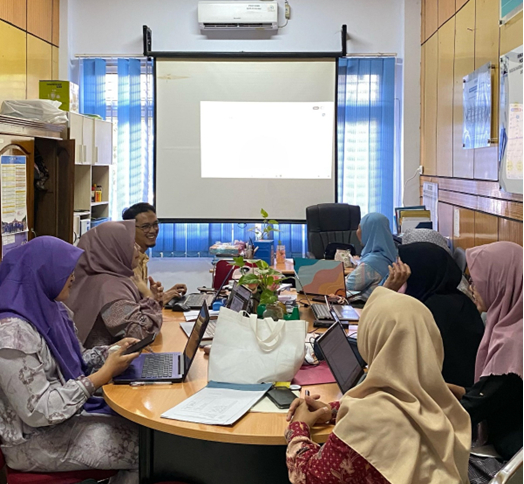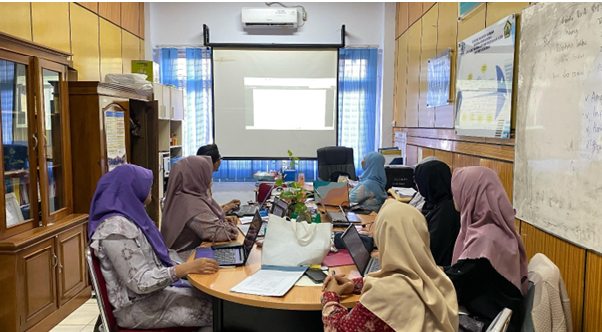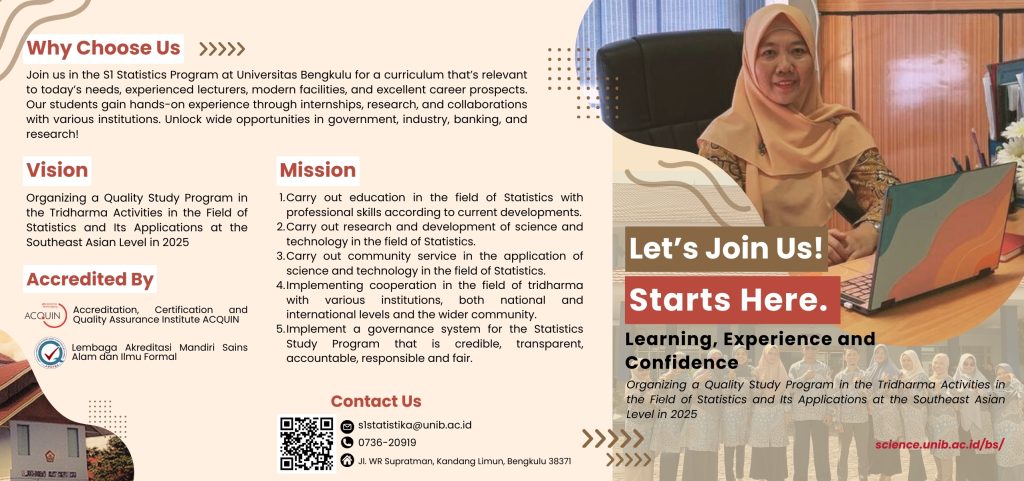
Scientific Discussion of the Bachelor’s Program in Statistics: “Probabilistic Population Projection Using Bayesian Hierarchical Model” / Diskusi Ilmiah Prodi S1 Statistika: “Probabilistic Population Projection Using Bayesian Hierarchical Model”
On March 20, 2025, the Bachelor’s Program in Statistics at the University of Bengkulu held its monthly scientific discussion with the intriguing topic, “Probabilistic Population Projection Using Bayesian Hierarchical Model.” The discussion was attended by faculty members from the Statistics Program and was met with great enthusiasm.
The speaker for this session was Firdaus, S.Si., M.Stat., an expert in applied statistics. In his presentation, Firdaus outlined his research plans and shared insights on how population projection can be conducted probabilistically using the Bayesian Hierarchical Model.
Firdaus began by explaining the benefits of population projection models for development planning, government policies, and natural resource management. Traditional population projection models often rely on deterministic approaches that provide a single projected value without considering existing uncertainties. In contrast, the Bayesian Hierarchical Model allows for a more realistic projection by accounting for data variability and future uncertainties.
This model integrates various information from historical and aggregate data to produce a more accurate projection range. Firdaus emphasized the importance of developing this model in the Indonesian context, given the dynamic nature of population growth and the need for reliable projections in social, health, education, and economic planning.
During the discussion session, faculty members had the opportunity to ask questions and engage in discussions on the challenges of applying the Bayesian Hierarchical Model. Key topics included selecting priors in the model, data limitations, and technical aspects of implementation.
The scientific discussion received positive feedback from participants who gained new insights into the application of advanced statistical methods in population projection. They were also inspired to further explore Bayesian applications in other statistical fields.
It is hoped that scientific discussions like this will enrich students’ knowledge and understanding of using statistical models to solve real-world problems. Additionally, such activities are expected to motivate students to continue exploring more innovative and practical statistical methods.

Pada tanggal 20 Maret 2025, Program Studi S1 Statistika Universitas [Nama Universitas] mengadakan diskusi ilmiah bulanan dengan topik yang sangat menarik, yaitu “Probabilistic Population Projection Using Bayesian Hierarchical Model”. Diskusi ini dihadiri oleh dosen dari Prodi S1 Statistika.
Pemateri pada diskusi ilmiah bulan ini adalah Firdaus, S.Si., M.Stat. denganbidang keahlian statistik terapan. Dalam diskusi ini, pemateri memaparkan rencana penelitian dan berbagi ilmu tentang bagaimana proyeksi populasi dapat dilakukan secara probabilistik menggunakan Bayesian Hierarchical Model.
Firdaus, S.Si., M.Stat. membuka diskusi dengan menjelaskan model proyeksi populasi yang dapat bermanfaat untuk perencanaan pembangunan, kebijakan pemerintah, dan pengelolaan sumber daya alam. Dalam model tradisional, proyeksi populasi sering kali mengandalkan pendekatan deterministik yang memberikan satu nilai proyeksi tanpa memperhitungkan ketidakpastian yang ada. Sebaliknya, dengan menggunakan model Bayesian Hierarchical, proyeksi populasi dapat dilakukan dengan mempertimbangkan ketidakpastian serta variabilitas data yang ada.
Bayesian Hierarchical Model yang dibahas memiliki kemampuan untuk menggabungkan berbagai informasi dari data historis dan data agregat untuk menghasilkan proyeksi yang lebih probabilistik. Model ini memungkinkan untuk memperoleh rentang proyeksi yang memperhitungkan berbagai faktor ketidakpastian yang bisa terjadi di masa depan. Firdaus juga menekankan pentingnya pengembangan model ini dalam konteks Indonesia, mengingat dinamika pertumbuhan populasi yang sangat dinamis serta peran penting proyeksi ini dalam merencanakan kebijakan sosial, kesehatan, pendidikan, dan ekonomi.
Selama sesi diskusi, rekan dosen diberikan kesempatan untuk bertanya dan berdiskusi mengenai tantangan dalam penerapan Bayesian Hierarchical Model, termasuk tentang isu-isu terkait pemilihan prior dalam model, pengolahan data yang terbatas, serta implementasi teknis yang harus diperhatikan dalam prakteknya.
Diskusi ilmiah ini mendapat sambutan positif dari peserta yang merasa mendapatkan wawasan baru tentang penerapan teknik statistik canggih dalam proyeksi populasi. Peserta juga merasa terinspirasi untuk lebih mendalami penerapan Bayesian dalam berbagai bidang statistika lainnya.
Harapan kedepan, diskusi ilmiah seperti ini dapat memperkaya pengetahuan dan pemahaman mahasiswa dalam menggunakan model statistik untuk memecahkan masalah nyata di masyarakat, serta memotivasi mahasiswa untuk terus menggali metode-metode statistik yang lebih inovatif dan aplikatif.




